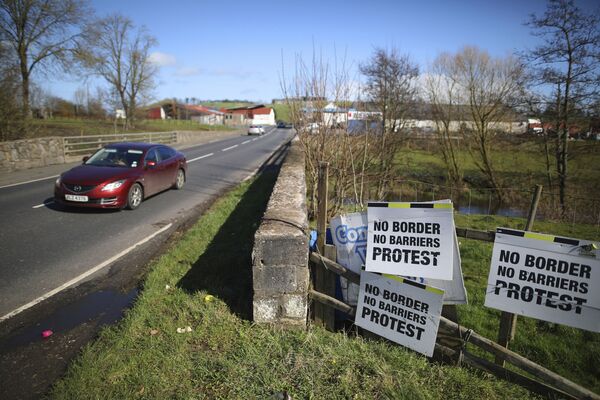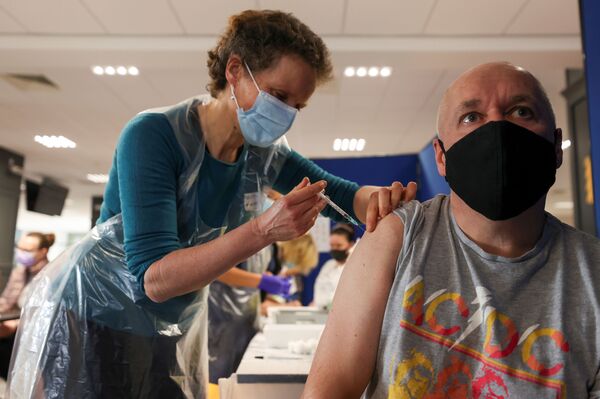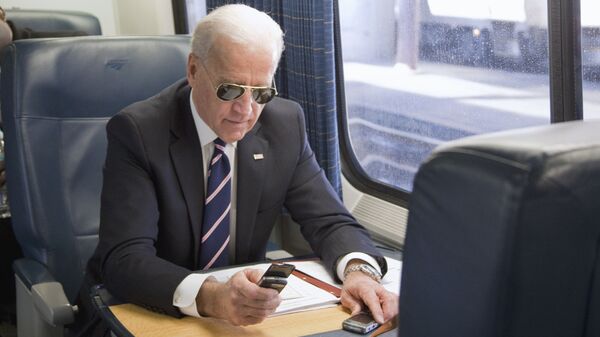Ireland officials possibly threatened to use their government’s connection to US President Joe Biden to force the European Commission to backtrack on its threats to trigger Article 16 of the Northern Ireland Protocol and impose export controls on COVID-19 vaccines, according to The Telegraph.
Amid the heated row between the UK and the European Union, which was under fire for lagging behind in its anti-COVID rollout, diplomats in Brussels reportedly speculated that Dublin could have 'picked up the Batphone to Biden' to sway the bloc’s stance.
Ireland had been blindsided by the European Union’s threats, triggered by the dispute over vaccine producer AstraZeneca’s jab delivery commitments to the EU.
The unexpected developments forced a telephone call between Michael Martin, the prime minister and head of government of Ireland, and Ursula von der Leyen, the European Commission president.
Constructive talks with Prime Minister @BorisJohnson tonight.
— Ursula von der Leyen (@vonderleyen) January 29, 2021
We agreed on the principle that there should not be restrictions on the export of vaccines by companies where they are fulfilling contractual responsibilities.
Brussels’ diplomats reportedly suggested Dublin could have reminded the EC head that Biden, who has Irish roots, has regularly warned the UK against installing a hard border in Ireland - one of the foundations of the final Brexit agreement.
EU officials were swift to reverse their decision on Friday night and acknowledge that invoking emergency powers to control trade across the Northern Irish border had been a mistake, as preventing controls at the border was the central issue in five years of Brexit negotiations.
"It's a lot better to realise early on that something might be a problem and to change it, than to stick to your guns and dig a hole for yourself," an EU official was cited as saying on Saturday.
Ireland officials reportedly believe that the EU had acted in haste, failing to fully understand the ‘sensitivities’ of the protocol.
‘Time for Cool Heads and Solidarity’
Political parties in the north and south of Ireland put aside differences to concur that the EU move would have been a disaster.
Arlene Foster, the first minister of Northern Ireland, described the threat by Brussels to trigger Article 16 of the Northern Ireland Protocol as an “incredible act of hostility”.
"By triggering Article 16 in this manner, the European Union has once again shown it is prepared to use Northern Ireland when it suits their interests but in the most despicable manner - over the provision of a vaccine which is designed to save lives," said the Democratic Unionist Party (DUP) leader Arlene Foster.
I’ve spoken with the Prime Minister @BorisJohnson and @michaelgove this evening. The Government must now take robust action including using Article 16 to advance Northern Ireland and the rest of the United Kingdom. pic.twitter.com/ugemDdll9z
— Arlene Foster #WeWillMeetAgain (@DUPleader) January 29, 2021
Colum Eastwood, the leader of the SDLP, the moderate nationalist party, branded it a “serious error of judgment”.
EU Com statement tonight confirming NI Protocol Art 16, safeguard clause, will not be triggered.
— Simon Coveney (@simoncoveney) January 29, 2021
Welcome news, but lessons should be learned; the Protocol is not something to be tampered with lightly, it’s an essential, hard won compromise, protecting peace & trade for many. pic.twitter.com/QLKpfhR9Yt
Simon Coveney, the Irish foreign minister, tweeted that 'lessons should be learned from the situation.
Spoke with @MarosSefcovic @michaelgove @BrandonLewis today. We agreed to focus on protecting Ire/NI Protocol & to ensure that implementation works for everyone.
— Simon Coveney (@simoncoveney) January 30, 2021
Protocol is there to protect relationships, facilitate trade, avoid borders. We’ll cont. to work on outstanding issues.
Louise Haigh MP, Labour's Shadow Northern Ireland Secretary, said the move by the EU was "deeply destabilising and undermines the huge efforts being made to make the Protocol work".
Sinn Fein leader Mary Lou McDonald described the EU's use of Article 16 as a "grave error".
Calls for a tit for tat invocation of article 16 by the British government are utterly reckless. The protections of the Irish protocol were hard won. Noone should place those protections in jeopardy. Brexit causes real damage to Ireland we need to protect our island.
— Mary Lou McDonald (@MaryLouMcDonald) January 30, 2021
The use of #Article16 is a grave error. Our citizens need timely access to lifesaving vaccines not trade disputes. Now is a time for cool heads and solidarity.
— Mary Lou McDonald (@MaryLouMcDonald) January 29, 2021
Northern Ireland Protocol
The Northern Ireland Protocol is a special deal aimed at preventing the re-emergence of a hard border between Northern Ireland and the Republic of Ireland.
Article 16 of the Northern Ireland Protocol is a safeguard that would allow the UK or EU to act unilaterally if measures imposed as a result of the protocol are deemed to be causing "serious economic, societal or environmental difficulties".

Of late, unionist politicians in Northern Ireland have been urging the UK government to trigger Article 16 to reduce checks on goods entering Northern Ireland from the rest of the UK, amid interrupted trade flows.
The difficulties arose as Great Britain is now outside the EU single market, while Northern Ireland is still following many single market rules. Northern Ireland gets its vaccine supplies through the UK procurement system.
However, Downing Street has been resisting the calls, insisting the new arrangements are workable.
Jab Supply Row
As politicians in the EU are under fire over shortcomings in vaccine rollout, the bloc was furious earlier to discover that British-Swedish drugmaker AstraZeneca would delay delivery of promised jab doses to the EU by March over production problems in Belgium.
The shortfall is expected to be about 60 per cent in the first quarter of 2021. The EU has also received fewer than expected doses of its two other approved vaccines, by Pfizer-BioNTech and Moderna.

As Brussels insisted AstraZeneca honour its commitments, the drugmaker said its contract for UK supplies prohibit that, as it was on course to fulfil Britain's order.
The company's CEO Pascal Soriot said earlier this week that the contract obliged AstraZeneca to make its "best effort" to meet EU demand, without compelling it to a specific timetable.


